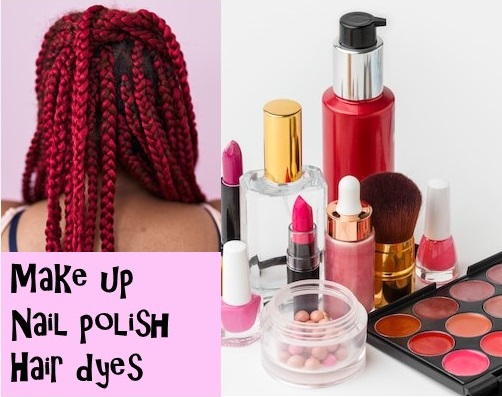By Adebowale Bello. B.Tech Microbiology. Freelance Health Writer. Medically reviewed by the DLHA Team.

PFAS containing beauty products can be harmful during pregnancy and breastfeeding. Images from Freepik:
A stylish hairdo, a touch of makeup and polished nails can elevate a woman’s confidence. In a world where beauty often translates into confidence, personal care products have become indispensable. However, these beauty enhancers contain dangerous chemical compounds such as PFAS (Per- and polyfluoroalkyl substances).
PFAS are synthetic chemicals known for their resistance to oil, water and heat. They were discovered in the 1950s and have become widely used in personal care products ranging from water-resistant makeup to long-lasting hair treatments.
While these features make beauty routines more convenient, they also come with a downside: PFAS persists in the environment and the human body for years—some for over eight.
A recent Canadian study has brought these hidden dangers to light, particularly for pregnant and nursing mothers.
The study, conducted across 10 Canadian cities, involved 2,001 pregnant women who were followed up throughout their trimesters with the aid of regular interviews asking them how frequently they used beauty products such as hair relaxers and makeup. 69% of the participants were also followed after childbirth and their responses were obtained through standardized questionnaires that they completed reporting their usage of products like hair dyes, relaxers, perfumes, lotions and moisturizers.
Breast milk and blood samples were then collected, processed and analyzed to check for the presence of harmful substances in lactating and pregnant women respectively.
The study showed that nearly everyone tested had PFAS in their system, primarily through food and water. However, the unexpected revelation was the extent to which personal care products contribute to exposure to these harmful chemicals, especially for pregnant and breastfeeding women.
Related: What You Should Know About Pregnancy and 6 Breastfeeding Tips for New African Moms
According to the study, women who frequently used hair sprays or dyed their hair during pregnancy had notably higher PFAS levels in their blood and breast milk. Permanent hair dyes were found to be the most problematic, raising concerns about long-term exposure for both mothers and their infants. Women who frequently used hair sprays or dyed their hair had notably higher PFAS levels in their blood and breast milk. Women who used makeup every day and those who regularly applied nail products also exhibited elevated PFAS levels.
For many African women, hair sprays, gels and dyes are important beauty items, however the presence of PFAS highlights a hidden cost in beauty products that many African women regularly use.
Exposure to these harmful chemicals have been linked to various health problems, including: heart problems, liver disease, cancers, neurodevelopmental disorders in children and poorer vaccine responses.
For pregnant women, these chemicals can cause serious complications such as preterm birth, low birth weight and long-term developmental issues in children.
Given the rising concern about the health of African children and the importance of early childhood development, African mothers who cherish their beauty products need to make smarter, informed choices.
If you’re a pregnant or breastfeeding mother, it’s important to make informed choices about the products you use. Here’s how you can reduce your PFAS exposure without compromising your self-care routines:
The prevalence of PFAS underscores the need for stringent regulations. While African countries are making efforts to align with global safety standards, increased awareness and advocacy can drive governmental action for safer products. The beauty industry is already responding with PFAS-free alternatives, enabling women to maintain their routines without compromising health. By staying informed, African mothers can protect both themselves and their children.
Source: Hall AM, Ashley-Martin J, Liang CL, Papandonatos GD, Arbuckle TE, Borghese MM, Buckley JP, Cecil KM, Chen A, Dodds L, Fisher M, Lanphear BP, Rawn DFK, Yolton K, Braun JM. Personal care product use and per- and polyfluoroalkyl substances in pregnant and lactating people in the Maternal-Infant Research on Environmental Chemicals study, Environment International, 2024;(193),109094, doi: 10.1016/j.envint.2024.109094. Available from here.
Published: December 3, 2024
© 2024. Datelinehealth Africa Inc. All rights reserved.
Permission is given to copy, use and share content for non-commercial purposes without alteration or modification and subject to attribution as to source.
DATELINEHEALTH AFRICA INC., is a digital publisher for informational and educational purposes and does not offer personal medical care and advice. If you have a medical problem needing routine or emergency attention, call your doctor or local emergency services immediately, or visit the nearest emergency room or the nearest hospital. You should consult your professional healthcare provider before starting any nutrition, diet, exercise, fitness, medical or wellness program mentioned or referenced in the DatelinehealthAfrica website. Click here for more disclaimer notice.